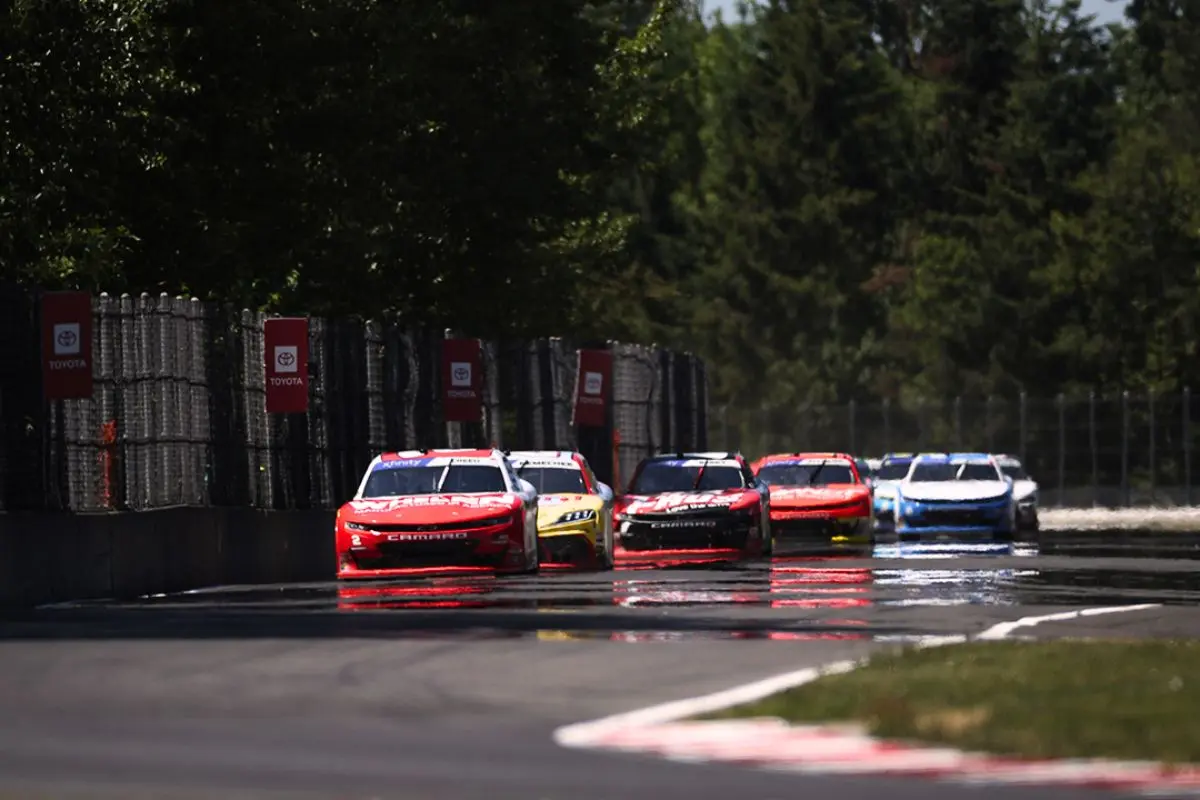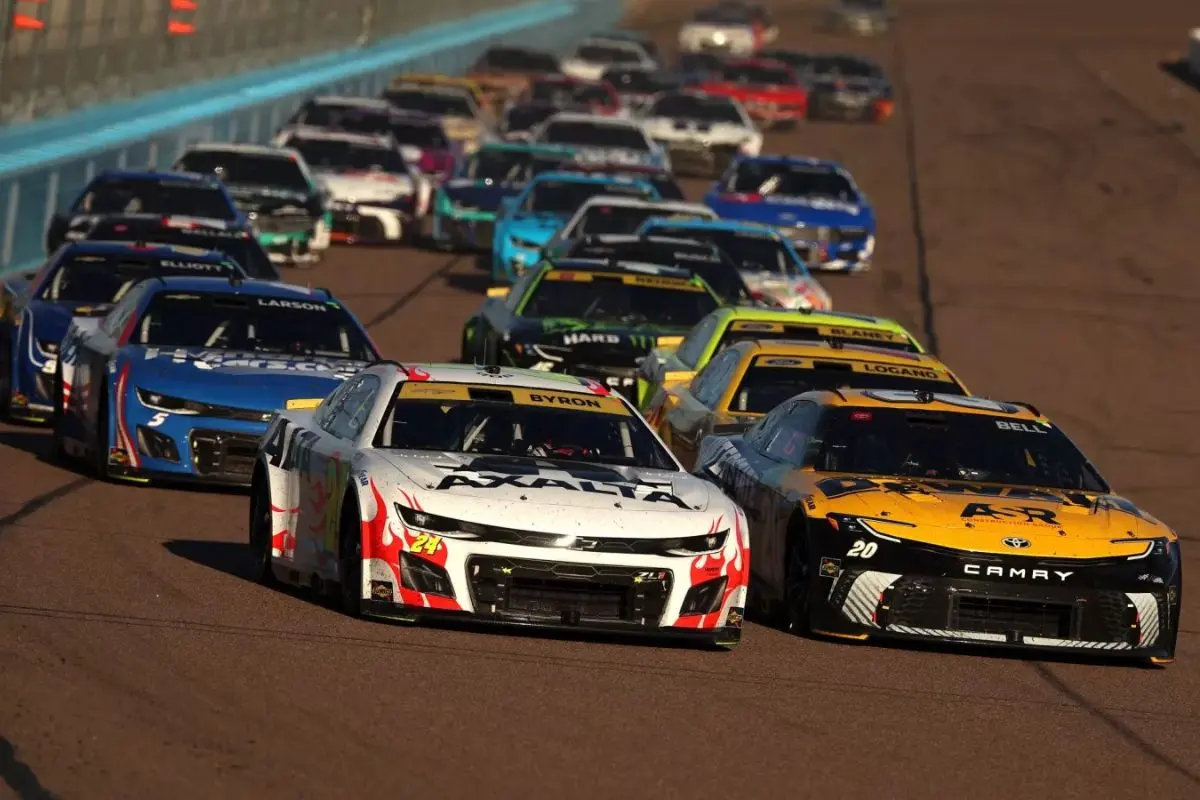As discussions about a potential reset of NASCAR’s playoff format gain momentum, fans are increasingly vocal about the shortcomings of the current “Chase” system. Many highlight its lack of track diversity and insufficient reward for consistent performance, drawing parallels to past seasons where top drivers like Jeff Gordon faced unfair challenges. The debate raises critical questions about the future of the playoffs and what changes could improve both fairness and competitiveness in the championship landscape.
Key Highlights
- Fans criticize the Chase format for its lack of variety in track selection, impacting competitive dynamics in the playoffs.
- The Latford point system’s implications raise concerns about fairness and the true merit of championship contenders.
- Advocates call for a return to the original Chase format, including wild cards to promote underdog participation.
- Historical anomalies, like Matt Kenseth’s 2003 title, emphasize flaws in win valuation within the current system.
- Proposals for a six-race playoff structure aim to enhance competitiveness and reward consistent performance throughout the season.
Dale Jr. and Chase Briscoe Reignite the Chase Format Debate
Dale Earnhardt Jr. and Chase Briscoe recently reignited the longstanding debate surrounding the NASCAR Chase format during an open discussion on the Dale Jr. Download.
Their conversation shed light on the evolution of the Chase, particularly the original 10-race structure that sparked both excitement and disagreement.
While acknowledging the drama of that era, they expressed a desire for a hybrid system that blends the merits of past formats with the current framework.
The modern Chase excels in seeding, a marked improvement over earlier iterations that either favored regular-season standings or wins exclusively.

Revisiting 2004, 2007, and 2010 with Modern Seeding
While reflecting on the historical context of NASCAR’s Chase format, it becomes clear that the seasons of 2004, 2007, and 2010 serve as vital examples of how modern seeding could have altered championship outcomes.
In 2004, Kurt Busch’s championship, achieved through consistency, might have shifted to Jeff Gordon or Jimmie Johnson under today’s system, which emphasizes both wins and points.
Likewise, in 2010, Kevin Harvick’s dominance could have thwarted Jimmie Johnson’s fifth consecutive title, as Harvick’s 20 regular-season leads would have earned him a considerable advantage.
Ultimately, 2007’s scenario, where Jeff Gordon’s remarkable performance was overshadowed by Johnson’s victories, could have favored Gordon greatly with a modern points structure.
These considerations highlight the potential for a more equitable championship landscape.
Fans Call Out the Flaws
As discussions about NASCAR’s Chase format continue, fans are increasingly vocal about its shortcomings, particularly in how it has influenced the sport’s competitive landscape.
Critiques emphasize the lack of variety in tracks and the implications of the Latford point system, which diminished the value of wins. Many fans advocate for a return to the original Chase with wild cards, arguing it allowed underdogs like Martin Truex Jr. to flourish.
The staleness of the schedule, particularly with Homestead as a perennial finale, compounds the issue. The current diversity of road courses and superspeedways has been positively received, yet fans contend that winning should hold greater significance, as evidenced by historical anomalies like Matt Kenseth’s 2003 title, which relied on a single victory.

The Jimmie Johnson Effect and Gordon’s Pain
The dominance of Jimmie Johnson during the height of the Chase era fundamentally reshaped perceptions of competition within NASCAR, emphasizing the tension between a driver’s regular-season performance and postseason outcomes.
Johnson’s six championships, including five consecutive titles from 2006 to 2010, highlighted a narrative where one driver could overshadow a field, prompting critiques of the format’s fairness.
“The primary problem people had with it was that of the 10 that happened, one guy won six of them.” – Nascar fan reaction
Jeff Gordon’s 2007 season exemplifies this dilemma; despite his remarkable statistics—30 top-10 finishes and a 7.3 average finish—Johnson’s ten wins ultimately secured the championship.
“I agree with you OP. To og chase was way too much a full bore reset that didn’t reward a dominant regular season. Think 2007 with Jeff Gordon. If the seeding is done correctly, the regular season champ should easily have enough points that they effectively get a ‘mulligan’ if they have a bad race.” – Nascar fan reaction
Fans argue that the current playoff structure, with its emphasis on postseason resets, fails to reward regular-season excellence.
This discord raises questions about the need for a balanced system that honors sustained performance while maintaining competitive excitement.
Bold Fan Fixes: Shorter Playoffs and Points Resets
Debates surrounding the fairness of the NASCAR playoff format have prompted fans to propose alternative solutions, particularly the idea of shortening the playoff season and revisiting points resets.
“It was (and is) too long relative to the regular season. Six races would have brought it in line with percentages from MLB, NFL, NBA. Then you do short track, mile, plate, road, and two 1.5s, the last one being at Charlotte to finish the season at home. Added bonus you can take the confetti’d champion car to the HOF just like the Daytona 500 winning car for the museum there.” – Nascar fan reaction
- Six-Race Playoff Structure: A condensed format featuring tracks like Martinsville and Charlotte would align better with other major sports, enhancing competitiveness.
- Varied Track Selection: Incorporating different track types—short, mile, plate, road—ensures a balanced challenge for all competitors.
- Revising Points Incentives: Restoring the 10-point win bonus, in conjunction with performance metrics, could harmonize aggression and consistency, addressing the flaws of the current “win-and-in” approach.
“The win-and-in aspect is why this system sucks. Ten bonus points for wins like the old days is more than enough incentive. Lap led bonus, most laps led, fastest lap, stage points, win bonus points, all help to create a points system that rewards performance and consistency.” – Nascar fan reaction
These changes could recalibrate the playoff system, encouraging a more equitable and engaging championship race.

News In Brief: NASCAR ‘Chase’ Format Under Fire as Fans Demand Playoff Reset
As discussions surrounding NASCAR’s playoff format continue, the criticisms of the Chase system reveal a growing desire for reform among fans. The historical references to seasons like 2007 highlight the perceived inequities in rewarding consistent performance. Proposed changes, including a six-race playoff structure and the reintroduction of wild cards, reflect a push for greater competitiveness and inclusivity. Ultimately, addressing these concerns may not only improve fan engagement but also restore integrity to the championship process.
ALSO READ: Emotional Goodbye: Amy Calls Out Dale Jr. as Daughter Isla Breaks Down
